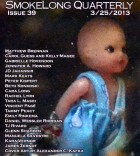“Vigil” pinpoints a mother’s worst fear and pushes the scenario to a nightmarish extreme through dispassionate repetition. Did you deliberately reject a more conventional narrative?
I wanted the structure to mimic her superstitious, ritualistic fears. There’s a distance between her imaginings and her emotions—partly because they are not real (the deaths), and partly because she is so terrified of letting go that she blocks her emotions. I think that is the ultimate control for her; by staying distant, she protects herself from vulnerability. Of course, love requires accepting vulnerability, so she’s also shutting herself off from that.
As these losses are recounted, I begin to doubt their veracity. They become a sort of incantation, perhaps a mother’s perverse attempt to protect her children: “Mary had read once that if you imagine the worst it won’t happen.” Do you have superstitions?
A few. I certainly knock on wood occasionally, and I think twice when a black cat runs across my path. I can see a part of my personality that is prone to this kind of thinking, and many of my characters have repetitive behaviors or superstitions. I used to have a recurring dream that I had to count as fast as I could and if I couldn’t count fast enough the walls would fall in on me; that has always stayed with me, and I think it’s the heart of Mary’s superstition—she thinks she can prevent something bad from happening by counting, imagining, preparing, lining up the salt and pepper shakers. Somehow, she knows that it will be her fault if the walls crash in, so she rushes to stay ahead of that disaster by controlling everything she can. The world doesn’t make sense, but that’s a hard thing to accept for all of us.
Is there some dark part of Mary wanting confirmation that, despite her maternal efforts, her best isn’t good enough?
I think there is—she would almost feel validated if something did happen. Just like in her imaginings, it would be due to something she did wrong, or that she could have prevented—which then gives credence to all of her behaviors and her beliefs about control. Mothers (parents) can’t always protect their children, and that has to be one of the worst truths that exist. Mary is not willing to believe that truthÖand ironically, she kills her own kids over and over again as a way to hang onto the illusion of control.
Would you mind sharing how this story originated?
I was staring out the window and, on a little metal tab at the bottom of my screen, saw the image of the child falling. Oddly, it struck me as really funny because I imagined some twenty-something starving artist being given the task to draw the warning label. I pictured him having to decide how far to go with it. Then I imagined a mother seeing that warning and reacting to it.
Do you have any rituals for shifting from English teacher to writer to whatever other hats you wear every day?
This is tough for me. I have no rituals or even successful strategies, though I have tried many. I don’t do well with discipline, and I’ve never been one to write for x amount of time a day or in the same place or with a particular pen. During the school year I can go months without writing at all, and then all of a sudden I will have a weekend where I get up and do nothing else. It’s hard to be a full time teacher and a writer, and when one has to give for me, it’s writing. So I try to capitalize on those productive weekends and not feel guilty the rest of the year!
I understand you’re writing a novel. How does writing flash help or hinder that experience for you?
HmmmmÖ.the novel. Right. That isn’t going so well. I really like the part I have finished, but haven’t been able to move it forward in a while. Part of the reason, I think, is that I have been really interested in flash fiction lately—both reading it and writing it—so when I do have time and energy to write, I find myself drawn to this instead. I love exploring a single moment or an image or an emotion, and find the crafting of flash fiction so rewarding. Maybe because I spend so much time as an English teacher looking at language and sentence constructions, I find myself drawn to a genre that demands such intentional craft. Each year I tell myself that I will finish the novel—and maybe 2013 will be the year!


